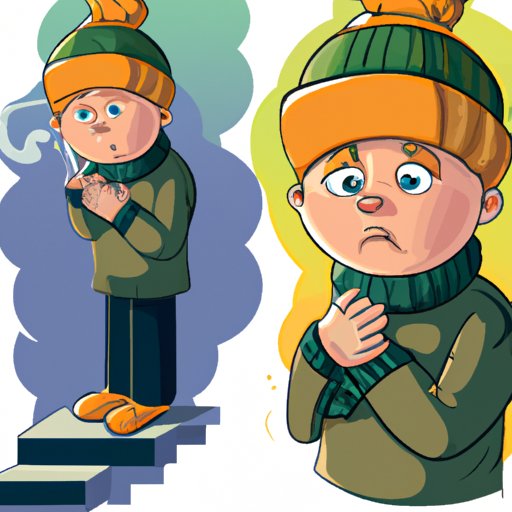
Introduction
As the temperature drops and winter settles in, many people believe that cold weather is a cause for colds and other illnesses. However, this is actually a myth that has been passed down for generations. In reality, it’s the germs – not the cold – that cause illness. In this article, we’ll explore this misconception about cold weather and its relation to illnesses. We’ll also explain the science behind the common cold and provide tips for preventing illness in the winter.
Debunking the Cold Weather Myth: Why Low Temperatures Have Nothing to Do With Your Illness
It’s a widely held belief that cold weather causes illness. When winter arrives, people stock up on vitamins and supplements, cover themselves with warm clothing, and avoid going out in the cold. However, there’s no direct causal link between cold weather and catching a cold. This is an example of correlation versus causation – cold weather and illnesses may be correlated, but they’re not necessarily causal.
For example, during the winter months, people are more likely to stay indoors in confined spaces, which leads to an increased risk of exposure to germs. As a result, there’s an uptick in illness during the winter months. However, this isn’t directly due to the cold weather. Rather, it’s the close proximity to others, coupled with our tendency to touch our noses and mouths, that make us more susceptible to germs.
Can Cold Weather Really Make You Sick? Separating Fact from Fiction
The science behind viruses and infections shows that cold weather doesn’t directly cause illness. While it’s true that a cold can weaken the immune system, which in turn increases your susceptibility to illness, the cold itself isn’t the cause of the infection.
So why do people believe that cold weather causes illness? One explanation is that they’re simply looking for a cause-and-effect relationship. It’s easier to attribute an illness to being cold than to believe that anyone can get sick at any time.
The Truth About Winter Illnesses: Why Germs, Not Cold Weather, Are to Blame
The true cause of most winter illnesses is germs. These bacteria and viruses are transmitted through tiny droplets of saliva or mucus from an infected person’s nose or mouth. This can happen when someone sneezes or coughs or even through sharing utensils or drinking glasses.
Hand-washing and good hygiene are crucial when it comes to preventing the spread of germs. Viruses can live on surfaces for hours, so it’s important to wipe down frequently touched areas and to wash your hands often. Covering your mouth when coughing or sneezing can also prevent the spread of germs, as can staying home when you’re feeling unwell.
Busting the Myths: Why Common Cold Misconceptions Could Be Harmful to Your Health
There are many misconceptions when it comes to winter illnesses. One common myth is that getting cold or wet feet will make you more susceptible to catching a cold. However, there’s no evidence to support this claim. Another misconception is that taking antibiotics can cure a cold. Antibiotics are only effective against bacterial infections, not viruses like the common cold.
Believing these myths can actually be harmful to your health. For example, if you’re under the impression that cold weather makes you sick, you might not take the necessary precautions to prevent illness, like washing your hands regularly or avoiding contact with sick people.
Understanding the Science Behind Common Cold: Insights into Why Cold Weather may not Increase your Risk of Illness
The common cold is caused by a virus, not by cold weather. When the weather gets cold, people tend to spend more time indoors, which increases the likelihood of exposure to the virus. Additionally, the cold weather can dry out mucous membranes in the nose and mouth, which can make it easier for viruses to enter the body.
However, a lack of exposure to sunlight and vitamin D during the winter months can weaken the immune system, making it harder for the body to fight off germs. Getting enough sleep, eating a balanced diet, and exercising regularly can help boost your immune system and prevent illness.
Don’t Let the Cold Temperature Deceive You: Here’s Why The Cold Won’t Get You Sick
In conclusion, cold weather doesn’t directly cause illness. Rather, it’s the germs that are responsible for winter illnesses. While the cold itself might not make you sick, it can weaken your immune system and make you more susceptible to catching a virus. Therefore, it’s important to take steps to prevent the spread of germs, like washing your hands regularly and staying home when you’re feeling unwell.
Conclusion
It’s essential to understand the science behind winter illnesses to prevent getting sick. The notion that the cold weather itself causes illnesses is a common misconception that has deceived generations. However, knowledge is power. You can take the necessary precautions and avoid engaging in risky behavior to prevent getting sick. It is important to debunk the myths that surround winter illnesses and educate yourself about the proper steps to take. Remember, the cold won’t make you sick, but exposure to germs will.





